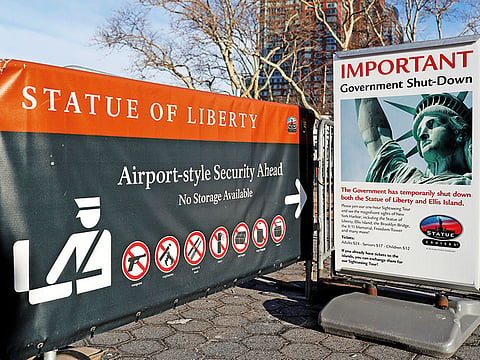Military becomes key front in US shutdown battle
We will continue to execute daily operations around the world, Mattis says

Washington: Defence Secretary Jim Mattis said in a memo released by the Pentagon on Saturday that the US military will continue to carry out operations across the world, but the shutdown already was prompting the cancellation or delay of training for reserve units and was having other effects. Mattis pledged to do his best to mitigate disruptions and financial impact on military families.
“We will continue to execute daily operations around the world — ships and submarines will remain at sea, our aircraft will continue to fly and our warfighters will continue to pursue terrorists throughout the Middle East, Africa, and South Asia,” Mattis wrote. “While training for reservists must be curtailed, active forces will stay at their posts adapting their training to achieve the least negative impact on our readiness to fight.” Mattis added: “Steady as she goes — hold the line. I know our Nation can count on you.”
According to a Pentagon planning memo posted this week, all active duty uniformed personnel are to continue their duties, but they will not be paid until after the shutdown is resolved.
Col. John Thomas, a spokesman for US. Central Command, said the shutdown would not have a significant impact across the Middle East, where US troops are conducting operations against militants in Syria, Afghanistan, Yemen and elsewhere, and where the US military has a host of major bases.
President Donald Trump accused the Democrats on Saturday morning in a tweet of “holding our Military hostage over their desire to have unchecked illegal immigration,” a reference to the dispute that is at the heart of the shutdown.
But the situation wasn’t that simple. While Trump, House Speaker Paul Ryan, R-Wis., Senate Majority Leader Mitch McConnell, R-Ky., and other Republicans blamed the Democrats, Sen. Claire McCaskill, D-Mo., made an effort shortly after midnight to get the troops’ salaries and death benefits paid through the shutdown. “I want to make sure that tonight we send a very clear signal that we don’t want one moment to pass with there being any uncertainty of any soldier anywhere in the world that they will be paid for the valiant work they do for our national security,” McCaskill said, calling for a resolution to pay the troops.
McConnell scuttled the effort, objecting to her motion.
As Mattis predicted in public remarks Friday, military reservists across the country travelled in preparation for scheduled training this weekend, only to be sent home after the shutdown at midnight. While some live close to their units, it’s common for reservists to travel several hours to bases for drilling.
Bryan Salas, a Marine Corps veteran, said his son travelled from West Virginia on Friday to report to training this weekend at Marine Corps Base Quantico, Virginia, but returned hours later.
“He just went back to West Virginia about a half-hour ago,” Salas said around noon Saturday. “It’s just time wasted. He’s a student, but there are others who have jobs and their own businesses who planned for this training.”
While uniformed personnel are largely shielded from the shutdown’s effects, civilian employees whose jobs are not deemed critical to defence operations will be furloughed, according to the same Pentagon memo.
There are more than 740,000 Defence Department civilians. Mattis said Friday that about half of them would be furloughed. The Defense Department did not respond to repeated requests on to provide a precise number of furloughed employees.
On Saturday, other effects were felt across the military. One particularly sensitive one is the temporary suspension of $100,000 payments promised to military families in the event their loved one dies so that they can travel and prepare funerals. Several non-profit, including Fisher House and the Tragedy Assistance Program for Survivors (TAPS), offered to assist families that might be in need. The Armed Forces Network, which carries television broadcasts of sporting events and other programming, was taken off air at midnight, leaving deployed US troops without one common way to watch National Football League playoff games this weekend.
— Washington Post
Sign up for the Daily Briefing
Get the latest news and updates straight to your inbox



